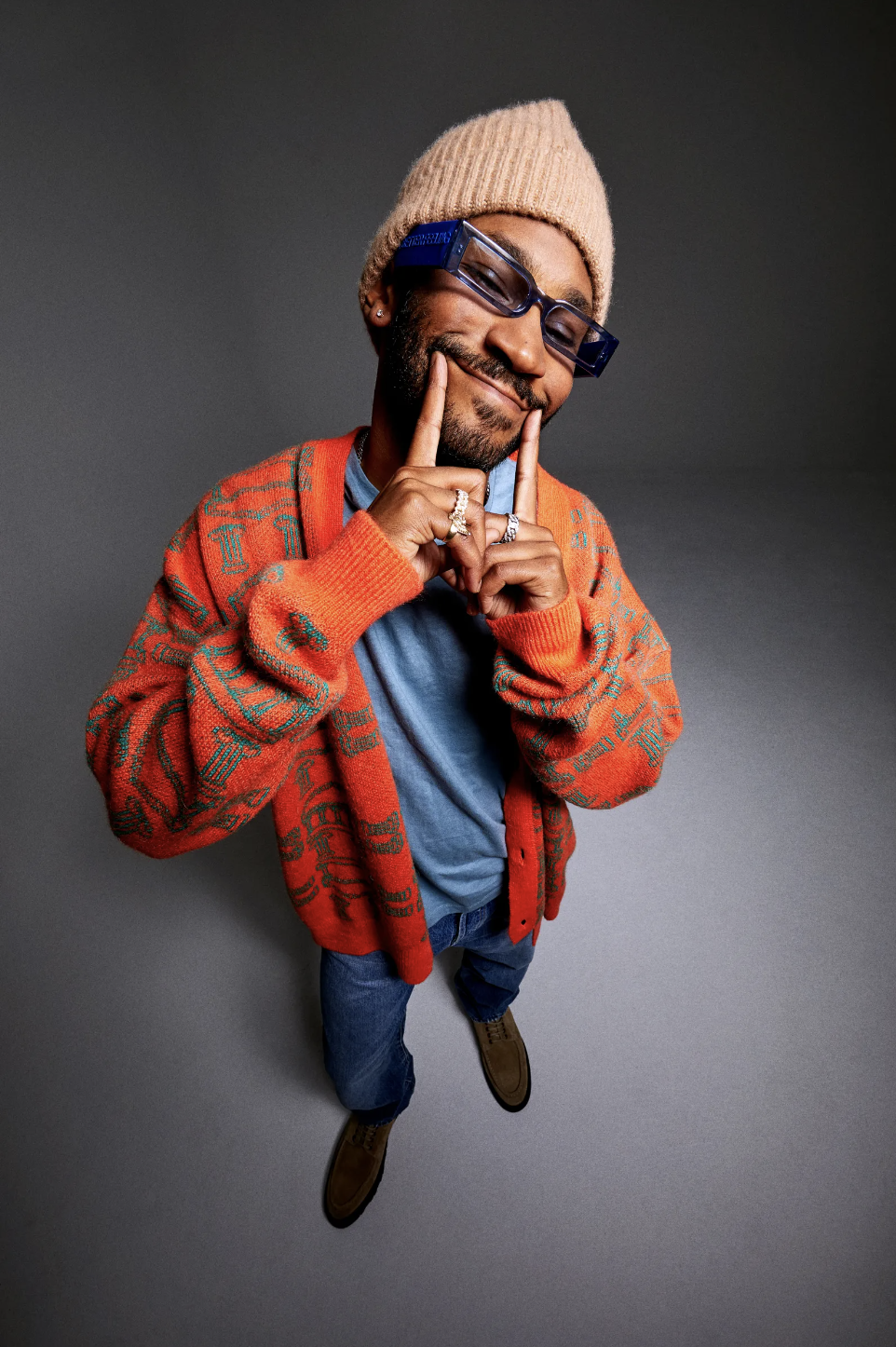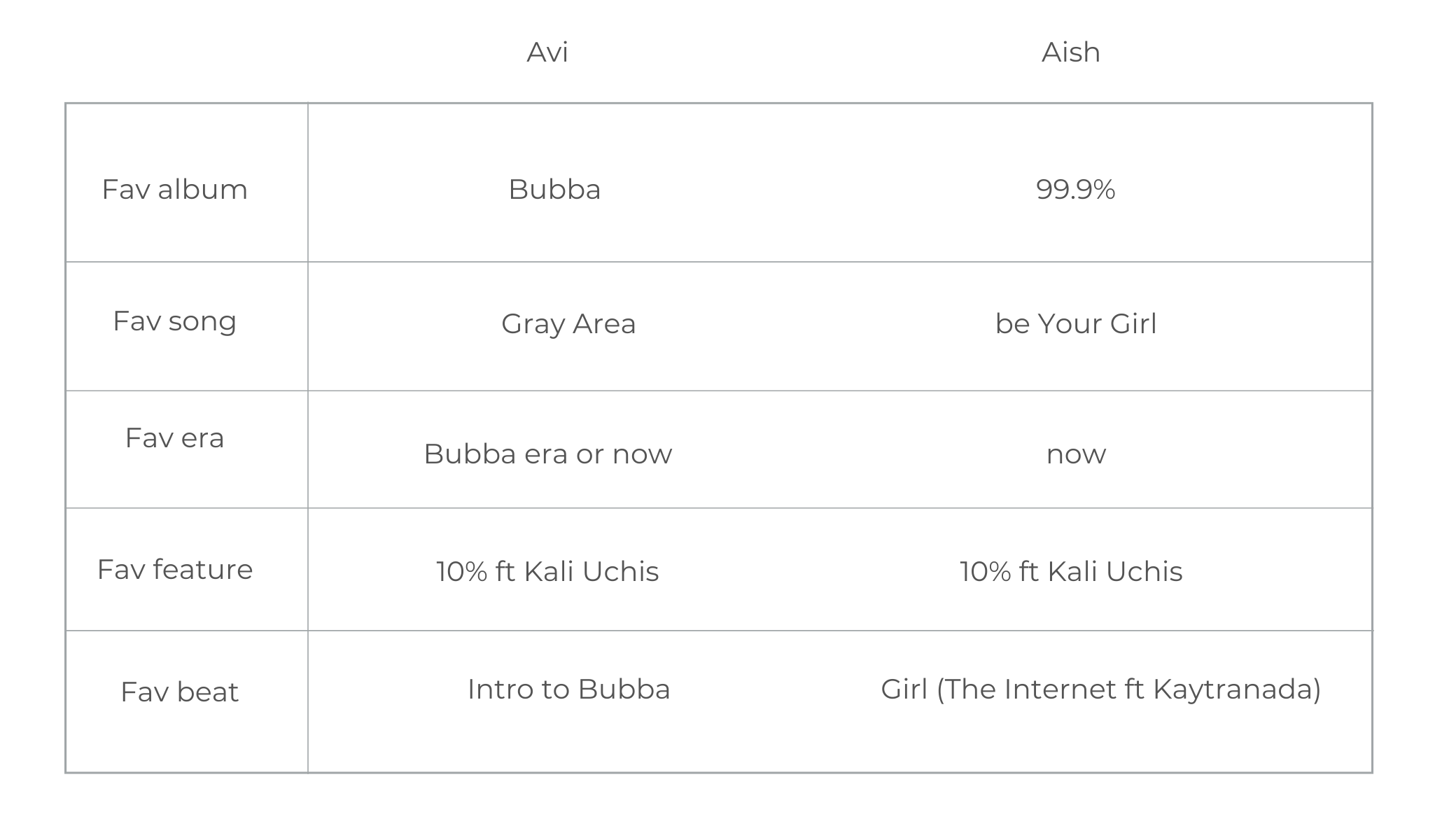05/09/2023
Taste and Discernment: A Case Study on KAYTRANADA
notes on creating without fear and building artistic identity
KAYTRANADA has one of the most distinct, instantly recognizable sounds out there. His artistic identity is unparalleled, making him impervious to replication.
Pharrell put it well: “There’s a consistency.. People have sounds, but not many people have a thing that they know how to make you feel every time you hear their music.”
On another note, Rick Rubin says, "what I have to offer is, as a fan, I can say what I like and what I don’t like. And I don't necessarily know why, but I'm true to my taste and try to steer in a direction that feels natural and good to me."
Rick Rubin has no musical skill, but he has what Jerry Seinfeld identifies as the ultimate skill of the artist: “taste and discernment.”
“It’s one thing to create,” Seinfeld said. “The other is you have to choose. ‘What are we going to do, and what are we not going to do?’ This is a gigantic aspect of [artistic] survival. It’s kind of unseen—what’s picked and what is discarded—but mastering that is how you stay alive.”
In February 2015, Rick Rubin started working with a then, not-that-famous Haitian-Canadian record producer, rapper and DJ, known professionally as KAYTRANADA.
If you’ve been listening to new projects by Drake or Beyonce or paying attention to the resurgence around 90s dance music, chances are you’ve heard Kaytranada’s name.
The Haitian-Canadian DJ/producer got his start as a teenager by uploading J. Dilla and Flying Lotus-inspired beats to SoundCloud. In 2012 his edit of Janet Jackson’s “If” exploded and became a massive viral hit. In the 10 years since, Kaytranada has remixed dozens of records and released two studio albums, including the Grammy award-winning Bubba.
In the following clip Rick Rubin and Kaytranada sit down to talk about how using technology unconventionally can lead to creating an entirely new sound. Kaytra also explains the anxiety he felt as an up-and-coming hip-hop producer who could never quite connect with an MPC drum machine. And he talks about what it’s like rocking stadiums as the opening DJ on the Weeknd’s worldwide tour.
I teamed up with Avi again to dive deep into Kaytranada’s musical style and influences. Previously we did Playboi Carti.
Below is the essence of our conversation.
Aish: Why do you like Kaytranada’s music?
Avi: I think the reason I like his music so much is because he's able to deliver a very warm, inviting sound. You know, an example would be when you're listening to it in your headphones, in a very pleasant outdoor environment, he's able to match that with really high quality sonics that translate well on big expensive speaker systems too.
I think he sometimes gets lumped into lo-fi.
Aish: Expand on lo-fi
Avi: Lo-fi is generally described as low fidelity music. It sounds like music that isn’t mixed well, isn’t mastered well, and it doesn’t have a very good balance across the frequency spectrum.
Aish: And it makes sense why students use it so much for studying – it’s a jumbled mess of sound that is “chill”. You don’t have to pay attention to it. You don’t have to focus on the melody. On the spectrum of noise to sound, it is noise leaning, but a sweet noise.
Avi: And adding to that, a lot of lo-fi music usually is deprived of very high quality, good sounding vocals. So if you have a stellar sounding vocal sound, then you are not making lo-fi music. You’re making high fidelity music. A lot of beat makers and producers will cut out a lot of high frequencies, and then sort of give it like you were saying, a mumbled noise, a sort of euphoric warmness to it.
But there is just a lot missing from the high end to really qualify it as being something that’s mixed well or high fidelity. Kaytanada’s music is definitely high fidelity.
Aish: And I think his beats are very complex as well.
Avi: They are. He’s a technical beast as far as constructing beats goes.
Aish: Let’s talk about that. What are your favourite beats? What is a great example of a super technical beat?
Avi: So Gray Area off of Bubba featuring Mick Jenkins – I was listening to that a week and a half ago on some very expensive speakers and I was just amazed at how prominent and incredible the low end sounded. But it still had a lot of fun elements to it.
Aish: I think those “fun” elements you just talked about lead to the virality of his beats. For example, You’re The One – I wouldn’t day is mainstream, but it is definitely viral. People recognize it. People can jam to it. People remember it. I think that is something about Kaytranada’s beats that is different from potentially other beat makers because they are so memorable.
Avi: Totally – he takes a lot of pop elements and makes them his own through his own filters and through his own lens artistically. It’s just so cool the way he does that.
Aish: What I really enjoy about a lot of his sounds is – he will have a female sounding voice in the background, it’s a common element in a lot of his songs. And I wonder if that part of the recipe for a great song is to have a baseline high frequency female.
Avi: When he’s making the actual beat or making the landscape, you could definitely – it’s not formulaic – but there is definitely a style to it. Female vocals take such a large part of what he does and just amplifies it. You wouldn’t have what he does without that soul. He does a lot of neo soul with that.
Aish: Oh totally. His album 99.9% won the Polaris Music Prize in 2016.
Avi: And he made that album with nothing, and that’s what a lot of bedroom producers do. Just him, his laptop, some features that he got emailed. He likely wasn’t even in the studio with all the features that showed up on 99.9%. It's really just such a perfectly pulled off beat making exercise. I like Bubba more, but 99.9% is super inspirational because he did that all in a literal basement.
Aish: The first song he ever sampled was Earth, Wind, Fire’s, September at 15 years old. He ended up dropping out of high school to pursue music full time to help support his family financially. This brings me back to another piece that I wrote about 99 percentile people, the Steph Curry one. You need a story to be devoted to your craft. That devotion is bound by some sort of fire that's lit under your ass. For Kaytra, it was the financial thing. Some people are curiosity-bound to an extent that is unfathomable whereas other individuals who have this goal in their head, “I want to do it for the outcome”, “ I want to win a Grammy”, “I want to do it because I want to be famous”. That objective-boundedness is obsessive to a certain extent, and that obsession runs out. Kaytranada – when you listen to his music, the fact that it's consistent in his own sort of feel to it all the time. He doesn't really stray away from it much while still experimenting. He's true to himself. And I think it really shows his devotion to his craft.
Avi: Totally. I haven't even listened to the beat tapes that he did, that didn't show up on streaming, that showed up on Bandcamp. Where he just remixes, just sampling all of these things that you couldn't possibly hope to clear. You don't do that because you want to win a Grammy. It makes no sense to remix Earth Wind and Fire and hope that you could actually become successful. Because to get that cleared, put it out and think “wow, yeah, that could be something” You do that literally only because I need to hear this. I don't even care if anybody else hears this. I can’t go to sleep until I hear this.
Aish: It relates back to being curiosity-bound versus being objective-bound. Because the quote goes, curiosity killed the cat, but satisfaction brought it back. He wasn’t satisfied until he heard how Earth Wind and Fire’s song September sounded to him as a sample in his own beat, and his own style.
Avi: He showcases the very true essence of a passionate beatmaker. And maybe that satisfaction doesn’t always come. But the satisfaction is in just doing it, about being curious about it. I think when you're 15 years old, and you go on FL Studio instead of doing a lot of things that 15 year olds do. There's just something about that. That's just not human.
Aish: How do you think he got so many cool features on his album 99.9%? He wasn't famous at that point yet, but the album featured GoldLink, Anderson .Paak, and Vic Mensa. He also collaborated with Craig David on the song "Got It Good." How did he make all of that happen? I think it's because people knew he was cool. He had already collaborated with Rick Rubin before 99.9, so he had some connections.
Avi: You know, I think this is a very personal thing for him, and I think he makes a lot of people feel very good. I think there’s a really selfless aspect in his craft. He is such an artist-friendly producer. His beats inspire melody and lyrics. So it doesn't surprise me that he got so many features. His beats are technically sound, and he doesn't compromise his integrity when he collaborates with artists. He really makes a fantastic beat that he's sure an artist would make even better. I think he goes in with that perspective. It's like, "Okay, I've made this beat, and it's so good. But I'm going to collaborate with this artist so they can make it even better, because that's the colour that's missing in what I've got here." He's committed to that, and I think that's why he's so successful. I'm surprised he hasn't done full-fledged albums for more people. He's done one for Amine, but that's way past due. In short, it's because he's very artist-friendly, and his beats have a vibe that inspires. If you're a singer, it's so much fun to sing over his stuff. It's up-tempo and warm. As far as the connections he's made, I don't know. Maybe he's a networking guru. But I think it's mostly because he's a great producer who is artist-friendly.
Aish: Let's talk about the legendary Montreal boiler room
Avi: I’ve seen it a couple of times. I think it’s a great example of how he is not just another LoFi beat maker because his beats sound so good in the club. They’re so crisp and so clear. There's not much more when you're in a certain mood that you want to be listening to just really solid, soul-driven sample-heavy club music. He does that flawlessly. So I just love that video because everyone's having such a genuine good time. It doesn't look forced. And everyone’s just naturally kind of dancing. And they're not necessarily great dancers, but they're just moving incredibly authentically.
Aish: I think you're right. I think because he has this niche and his sound as well. It probably gives him a really good intuition for mixing, for example transitions between different songs. So the entire boiler room feels so seamlessly curated when it wasn't at all. He didn't curate it in advance, but it feels that way.
Avi: It’s just a lot of practice over and over again.
Aish: He has discernment, an amazing “hunch” in recognizing the correct thing to do in the moment.
Avi: It's just like if it was on any other day, and there was even a slightly different audience, you wouldn't get the same setlist because the vibes are different. And he's reading the energy in the room and he's reading what people are reacting to. And he's picking his next songs based off of that and you can’t have a pre planned DJ set because that is no fun. You can't be afraid to make mistakes when you're doing that too. I think really he creates without any fear. And I think that's really important.
Aish: I think that's such a good point. He creates without fear, but also, as you said, he goes off of what the vibe in the room is. But the fact that he still stays in that niche while picking other artists in that niche’s songs. He must have sampled everything in that niche – not sampled in terms of sampling their music – but sampled in terms of listening to so many artists’ discographies and everything adjacent to that to know exactly what will go with what and what will transition into what and what will get what type of reaction, just having that natural instinct of what's going to sound like what is insane. Like Rick Rubin has that natural tendency to just know what's good. I guess what I'm describing is taste. He has impeccable taste.
Avi: The thing is with his taste, he just kind of really commits to what he likes. And I don't think he really cares if other people actually think. People are gonna like his taste in a setting like the boiler room because that's why they came to see him because they liked his taste. But I think when he was sort of starting out, he just kind of committed to what he liked. You don't sample Earth Wind and Fire because it's trendy. He’s always been committed to what he liked and didn’t like. And that’s how you cultivate taste.
Aish: Who do you think his influences are?
Avi: Madlib. He said that’s his favourite producer, and that makes a lot of sense. I think drawing that connection between Kaytranada and Madlib is such a logical, or such a natural evolution of the next step of where Madlib’s style of hip hop production should go in this decade and Kaytranada to carry on that legacy very well.
Aish: I feel like he has a lot of Chicago influence – artists like Chance the Rapper, who isn’t necessarily in the House genre, but it feels very Chicago
Avi: Well Chicago for sure because of the House roots. That blend of House music and Hip Hop is where he lives. That’s an astute observation.
Aish: I also think being from Canada and not having as much access to the music industry and just kind of always being a wallflower is why he turned to the style of music he did and started creating in the way he did. I think a lot of artists who are so devoted to their craft, emulate that in some way, shape or form.
Avi: When I was 15 is when I started getting into production and making beats. And there was nothing more I wanted other than for other people to experience my music in a live setting. But you can't actually go to experience that for yourself. So it makes you work harder on just being good because you just feel like, “Oh, I can't really get there unless it's through sheer talent”. You have to make something undeniable. And I think he really did that . When I think about undeniable music, I think about Kaytranada.
We ended off our dialogue with a speed round of our favourite Kaytranada album, song, era, feature, and beat.
I will leave you with a shameless plug for one of my most popular playlists (that went semi-viral on tiktok)
This piece is 39/50 from my 50 days of writing series. Subscribe to hear about new posts.


